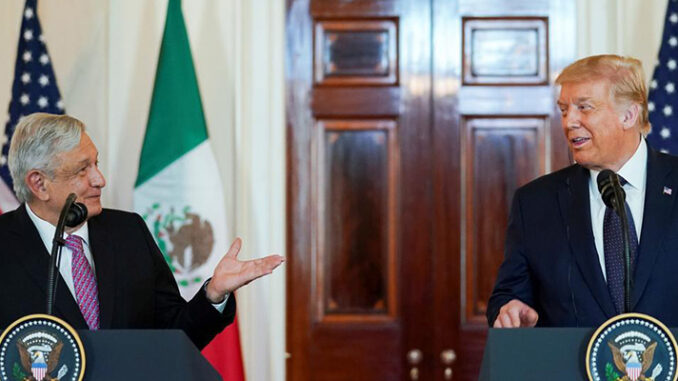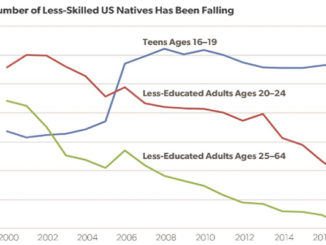
The Joseph Biden administration will seek to fundamentally recenter the turbulence-laden U.S. relationship with Mexico toward a much more comprehensive one anchored in lasting institutional cooperation.
by Vanda Felbab-Brown
The Joseph Biden administration will seek to fundamentally recenter the turbulence-laden U.S. relationship with Mexico toward a much more comprehensive one anchored in lasting institutional cooperation. The administration understands full well the necessary and beneficial interconnectedness between the two neighbors – not just of border communities but across the entirety of both countries. Neither President-elect Joseph Biden nor his incoming team will deploy invectives and derogating terms about Mexico and Mexican people as candidate and President Donald Trump has repeatedly done. The United States under Biden’s leadership will dispense with bullying and nuclear-option maneuvers like threatening to slam tariffs on Mexico. But that does not mean the relationship between the Biden and the Andrés Manuel López Obrador administrations will be easy. Multiple friction points are clearly visible on the horizon.
The disagreements will not simply be a legacy of President López Obrador’s stubborn refusal to congratulate Joe Biden on his electoral victory — a posture that places López Obrador in the company of authoritarians and populist leaders of North Korea’s Kim Jong Un, Russia’s Vladimir Putin, and Brazil’s Jair Bolsonaro. Even China’s Xi Jinping and Turkey’s Recep Tayyip Erdogan finally extended their congratulations. Though López Obrador’s stance has not helped the U.S.-Mexican relationship, however popular it is in Mexico, Biden is too much of a seasoned statesman and mensch to let such personalistic issues distort U.S. policy. Unlike the tantrum-prone and emotionally-unstable hyper-self-focused Trump, Biden’s U.S.-Mexico policy will be rationally focused on U.S. national and joint interests with Mexico.
Despite Trump’s invective and wild policy moves such as the threats of tariffs and disparagement of NAFTA, then a bedrock of the Mexican economy, López Obrador quickly became very comfortable with Trump, even bizarrely praising Trump for treating Mexico “with kindness and respect.” He has catered to Trump’s preferences on the two sole issues that Trump cared about in the U.S.-Mexico relationship – stopping migration and renegotiation of the North American Free Trade Agreement (NAFTA). As long as the López Obrador administration was willing to crack down on migration from and through Mexico to the United States, redirect its National Guard toward that purpose, not complain about the immensely environmentally-destructive and utterly pointless border wall, and renegotiate NAFTA to mandate greater U.S.-made content of goods, the Trump administration gave Mexico pass on a whole host of issues.
The Trump White House demanded little from Mexico regarding devastating homicide rates, the behavior of Mexican drug trafficking groups (DTOs), and poor rule of law in Mexico; also Mexico’s slow – even withering – progress on police and the justice system reforms; retrogression on energy reforms and the treatment of U.S. energy companies; and labor standards in Mexico, even as the newly-renegotiated U.S.-Mexico-Canada Agreement (USMCA) significantly enhances them. Nor did the Trump administration care about issues that the Obama administration did – and which the Biden administration will very likely raise: the quality of democracy in Mexico; environment protections and global warming; education reforms; police and justice system reforms; and basic rule of law. Even on something as fundamental as opioid flows to the United States, particularly of fentanyl, amidst the deadliest U.S. drug epidemic ever, the Trump administration was willing to swallow a lot of frustration with the lack of Mexico’s cooperation – all in exchange for López Obrador’s crackdown on migrants. Only major security flareups such as the massacre of the LeBaron family (dual citizens of Mexico and the United States), prompted greater U.S. demands – and led López Obrador to resurrect problematic high-value targeting of DTO bosses.
The López Obrador administration would very much wish to keep the nose of U.S. policy out of these issues. But it is unlikely to get such indifference from the Biden team.
Even though the migration problem will remain major challenge for the United States, the Biden administration is most unlikely to accept that Trumpian bargain. Large migrant flows from Central America and even Mexico are easy to imagine once the Biden administration assumes office: Covid-19 has suppressed national economies across the region, pushed up unemployment, poverty and inequality even higher while violence did not abate (with the exception of El Salvador). Like the Obama administration with its Alliance for Prosperity Plan for the Northern Triangle in which then-Vice-President Biden played a key role, the Biden administration will seek to address the underlying root causes of outmigration from the Northern Triangle – intense criminal violence, poverty, and inequality – by helping to build more capacious and less corrupt institutions in the Northern Triangle and encouraging economic growth and anti-poverty and equality reduction measures. This is the right thrust of policy, for which the Biden administration can employ important underutilized economic tools.
Such policy orientation may well provide important opportunities for U.S.-Mexican collaboration. After all, when López Obrador took office, he sought to address migration from Central America precisely through a U.S.-Mexico strategy of economic growth and development for Central America. But the Trump administration exhibited no interest, and instead defunded the Alliance for Prosperity.
The Biden administration will likely keenly focus on corruption, including drug-related collusion in highest government circles, that the Northern Triangle repeatedly features. And it will not close its eyes to anti-democratic and anti-human-rights moves of Central American governments simply because they are cracking down on migration. Its economic assistance will likely be linked to a thick involvement in institutional reforms and responsiveness to U.S. strong demands against corruption and collusion with criminal groups. That may be very uncomfortable for López Obrador because of his strong stance of non-interference in other countries — human rights, democracy, and rule of law abroad be damned.
Dealing with Venezuela and its repression of and brutality toward its people is a point in case. The Biden administration may loosen some of U.S. economic sanctions on Venezuela for humanitarian reasons and is most unlikely to try to instigate a coup in the country, something the Trump administration fantasized about. But Biden too wants a transition away from the Maduro regime. The Biden administration will not be pleased by López Obrador’s coddling of Maduro. Even if defined by Mexico as “neutrality,” such a posture will become all the more contentious in the U.S.-Mexican relationship if relations between Maduro and Iran continue to thicken.
And the Biden administration will disapprove of any backsliding of democracy in Mexico, such as government (and non-government) attacks against Mexican media and scientists. Similarly, it will very likely want to see progress on education reform in Mexico that is student-centered, instead of catering to problematic teachers’ unions, and thus not likely thrilled with the reform reversals that López Obrador introduced.
Not just the U.S. executive branch, but also Democrats in the U.S. Congress are deeply concerned about labor standards in Mexico and will seek the diligent implementation in Mexico of the new USMCA rules. Despite his focus on Mexico’s poor, López Obrador has cared far more about farmers in Mexico’s south than about what happens in the maquilas in the north. He does not relish the prospect of the United States trying to hold Mexico’s feet to fire on labor standards.
Green energy generation will be another important theme for the Biden administration – around the world, including Mexico and Central America. Yet harking back to the 1950s, López Obrador has embraced policies that exacerbate global warming and rolled back clean energy measures despite his campaign commitments to move Mexico away from fossil fuels. He has embraced Mexico’s struggling oil company Petróleos Mexicanos (Pemex). In addition, he has promoted the dirty, inefficient, corruption-ridden, and expensive Comisión Federal de Electricidad (CFE), allowing it to maintain close to a monopoly on electricity generation. He has sought to prevent more than 40 privately-owned wind and solar plants from connecting to the national electric grind. Lopéz Obrador has also cancelled Mexico’s fourth clean energy auction even though the prior three, unlike oil auctions, were highly successful, generating 7 gigawatts of clean wind and solar energy at a very low cost for consumers, much lower than CFE prices. These policies will directly clash with the Biden administration’s energy and environmental visions. Unlike the Trump administration, the Biden government will likely defend the contracts of U.S. energy firms that invested in the newly-liberated energy market in Mexico under Enrique Pena Nieto’s government and that are now hurt by López Obrador’s energy policy reversals.
Other environmental destruction in Mexico may also not go over well in Washington – such as habitat fragmentation due to the controversial Mayan Train that López Obrador wants to cut through pristine tropical habitats. Preserving native ecosystems, particularly of tropical forests, is all the more important because their destruction is the greatest source of zoonotic pandemics.
In turn, the Mexican government can rightly ask whether the Biden administration will be willing to be mutually responsive, collaborative, and accountable if it finds it necessary to impose a major economic lockdown in the spring of 2021 to counter the Covid-19 epidemic raging in the United States — and in Mexico. Much better coordination on what economies are vital for both countries will be needed than was the case in the spring of 2020, including from the U.S. side. Such cooperation is vital for the economies of both countries.
Anti-crime collaboration may pose another challenge. The Biden administration will care about drug flows from Mexico to the United States, particularly fentanyl flows. Although over the past year, the López Obrador administration moved into high-value targeting, it has not systematically focused on countering and dismantling fentanyl smuggling networks. Instead, it sought to reorient and shrink U.S.-Mexico Merida cooperation solely into drug treatment. A focus on public health dimensions should be a key component of drug policies. But it cannot operate without well-designed law enforcement. High-value targeting remains problematic, and the Biden administration should walk away from such a policy. But cleaning up Mexican ports, targeting the middle-operational layer of fentanyl smuggling groups, and preventing and countering fentanyl production in Mexico are very important.
Finally, the Biden administration will likely focus on the very high homicide rate in Mexico, that has continued to increase during the López Obrador administration. It may seek to collaborate with Mexico on bringing these rates down, likely emphasizing strengthening rule of law, police reform, and anti-corruption measures in Mexico. It can offer U.S. training for Mexico’s National Guard, an outreach that the López Obrador administration has rejected so far. There are good reasons to expect that the Biden administration will not be pleased by the dismantling and weakening of Mexico’s Federal Police capacities and will silently watch as Mexico tears up even well-functioning units to provide manpower for the struggling National Guard: After all, the Federal Police is where the Obama administration concentrated its efforts to help build up Mexico’s anti-crime institutions and a law enforcement agency that registered significant improvements.
Instead of hoping to shove those issues under the rug and tell the United States to mind its own business, the López Obrador administration should start exploring now how to fruitfully collaborate on them with the Biden administration.
Vanda Felbab-Brown is a senior fellow in the Center for Security, Strategy, and Technology in the Foreign Policy program at Brookings.



